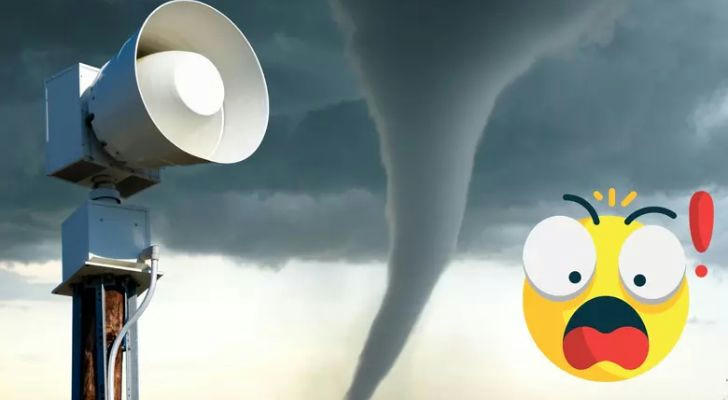🌀 Tornadoes & Hormones: How Midlife Stress Impacts Weather Anxiety in Women
Every spring, tornado alerts start buzzing across phones, TVs, and social media. For many middle-aged women, these warnings come with an unexpected side effect — a deep, lingering sense of anxiety. While fear of extreme weather isn’t new, recent science suggests that hormonal changes during midlife may amplify the emotional response to environmental threats like tornadoes.

🧠 Hormones, Anxiety & the Weather Connection
Research has shown that hormonal fluctuations during perimenopause and menopause can increase the risk of anxiety disorders. Estrogen and progesterone — key regulators of mood and stress response — begin to decline in women between the ages of 40 and 60. Meanwhile, cortisol, the body's primary stress hormone, may become more reactive.
📊 A 2020 study in The Journal of Affective Disorders found that perimenopausal women were nearly twice as likely to report heightened anxiety symptoms compared to their premenopausal peers. Although the study did not focus on weather-specific triggers, it supports the idea that stress sensitivity increases in midlife.
In parallel, the American Psychological Association reported in 2023 that climate-related anxiety (often called “eco-anxiety”) is growing, particularly in women aged 45–60 — though causality between hormones and weather anxiety still needs more research.
✅ Balanced view: Not all midlife women experience increased anxiety during storms. Individual health, environment, personality, and prior trauma (such as past experiences with severe weather) all influence how a person reacts.
📺 Media Overload: Fueling the Fear?
Emergency weather alerts are designed to save lives — but they can also provoke panic. The nonstop updates, live radar imagery, and social media speculation often heighten emotional reactions.
🎥 Pop culture can also shape perceptions. Movies like Twister or recent shows like The Weather Files dramatize tornadoes in ways that leave lasting emotional impressions, especially for those already on edge. While entertaining, such portrayals blur the line between awareness and alarm.
🧩 Scientific view: A 2021 University of Michigan study found that excessive media consumption during natural disasters was correlated with increased stress symptoms, especially in women, but stopped short of confirming long-term psychological harm.

👩👧👦 Why Middle-Aged Women May Be More Vulnerable
Let’s look at two nuanced factors:
1️⃣ The “Invisible Load”
Middle-aged women often juggle multiple roles — caring for aging parents, supporting adult children, and managing careers. In high-alert situations like tornado warnings, this mental burden multiplies. The question isn't just “Am I safe?” but also “Is everyone else safe?” This sense of responsibility can intensify stress responses.
2️⃣ Biology Meets Psychology
The amygdala, the brain’s fear center, may become more active during hormonal changes. When combined with lower serotonin levels, emotional regulation becomes harder. But not all women experience this — some report becoming less emotionally reactive with age, citing increased confidence and experience.
🔁 Counterpoint: While hormonal changes may explain part of the puzzle, they don't account for cultural, regional, and personal differences in how women experience storm-related anxiety. Some women may feel more in control now than in their younger years.
🐾 Coping Creatively: Pets, Routines & Humor

Many women turn to pets for comfort during storms. Dogs and cats often sense changes in barometric pressure and respond early to approaching weather — creating both anxiety and companionship.
📱 Social media also provides a strange sense of relief. Viral videos of pets in thunder jackets or humorous weather memes offer brief distractions that lighten emotional load.
✔️ Mental health experts recommend creating structured plans for severe weather — having a go-bag, prepped shelter space, and communication plan. These steps reduce the feeling of helplessness, offering a sense of control, which is key to managing anxiety.
📌 Takeaways: What Can Help?
✅ Recognize Personal Triggers
Is it the siren? The flashing news banner? Being alone during alerts? Knowing your specific anxiety source makes it easier to manage.
✅ Review Health & Hormone Status
Women experiencing persistent anxiety during storms might benefit from speaking with a healthcare provider about hormone-related mood changes. Cognitive Behavioral Therapy (CBT) has also shown success in reducing weather-related anxiety.
✅ Stay Informed, Not Overwhelmed
Use reliable weather apps that allow you to set limited alerts. Avoid endless scrolling during storms.
🌈 Conclusion: Awareness Over Alarm
Tornadoes are serious threats, but the emotional weight they carry for midlife women is shaped by more than just wind speed. It's a blend of biology, responsibility, past experiences, and media influence.
Understanding the science behind hormonal stress reactions doesn't mean giving in to fear — it means being equipped to face it smarter. Whether that’s by adjusting routines, setting healthy boundaries with media, or reaching out for support, the goal is not to remove fear entirely — but to reshape the relationship with it.
🌀 Storms may shake the sky, but resilience comes from within — and that’s stronger than any siren.
